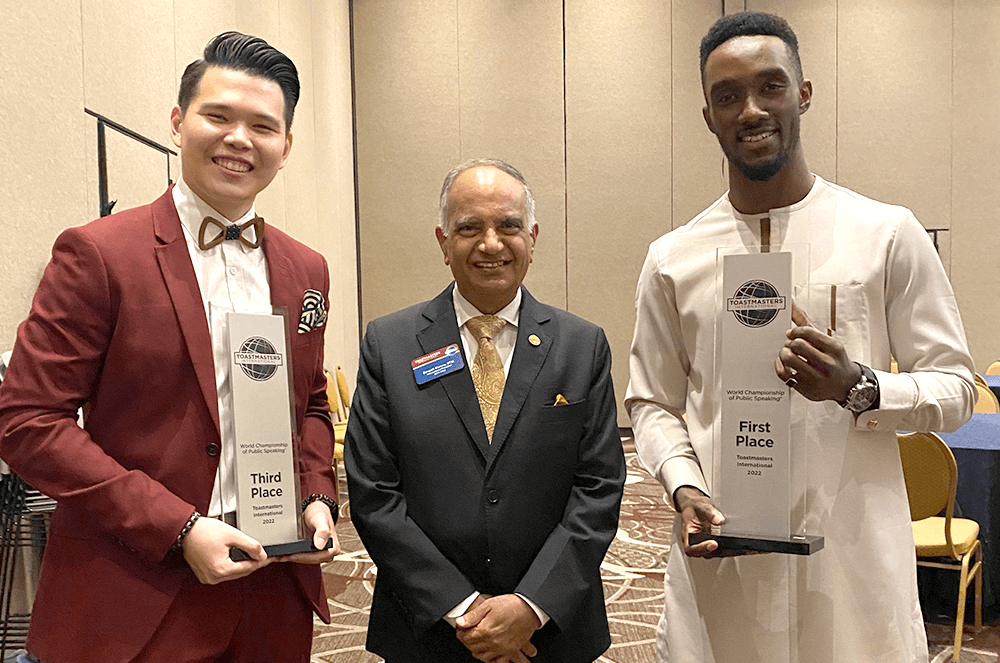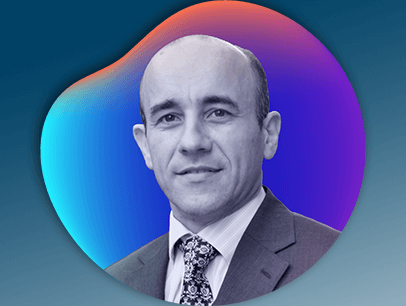
This annual speech contest recognizes outstanding speeches by Toastmasters in undistricted clubs and provisional Districts. The speeches are recorded live during their club-level contest, and the first-place winners in those contests are later judged by a panel of Toastmasters.
Below, the 2022 winners reflect on their experience.

First place:
Angela Heath
Advanced Online Presenters/College Park, Maryland, United States
Angela Heath’s winning speech was about recapturing the dreams and goals you envision when you are younger. Although people often let go of those dreams for various reasons, you can still achieve them if you are determined, no matter what your age, says Heath.
She first joined Toastmasters more than 20 years ago. She was a member for five years, then left and rejoined Toastmasters in 2020. “I took a long break to care for a sick child,” says Heath, who was honored in person at the convention for her win.
I did not use a virtual background or PowerPoint to paint a picture, so I had to use my joy and believe in the message.
–Angela Heath, first-place winnerWhen speaking on video, she says, she employs tactics such as using the camera frame to maximum effect. “With virtual speaking, I try to use my stage effectively. Movement is limited but we can make sure our gestures are seen and you don’t have lobster claws showing up on the screen (when you just see the tips of fingers ascending on the screen) and you can move in closer to really make important points.”
Passion was her primary tool. “I did not use a virtual background or PowerPoint to paint a picture,” says Heath, “so I had to use my joy and believe in the message.”

Second place:
Anum Qadri
Karachi Toastmasters Club/Karachi, Pakistan
The theme of Anum Qadri’s speech was related to goals—specifically the journey to achieve them at your own pace. As she puts it, “When you have set your goals and you know your destination, then it doesn’t matter whether you are slow or too fast in working toward them. Ultimately, you’ll always reach them.”
Qadri has been a member of the Karachi Toastmasters Club in Pakistan since 2019. She says she prepared a great deal for the Video Speech Contest. “I practiced a lot, got a speech evaluation from almost every member of my club, approached various mentors around the world and presented different speeches to get their evaluations, and applied those in my contest speech accordingly.”
She focused on maintaining strong eye contact and showing passion and sincerity. In a video contest, she adds, “one’s delivery should be such that it demonstrates that being online is not a hurdle, but a connection.”
Qadri says her Toastmasters skills have helped in her job as a secondary school teacher. She expresses herself more effectively to students and “gets their maximum attention during class lectures.”

Third place:
Srushti V.
Virtual Professional Speakers/ Ottawa, Ontario, Canada
The focus of Srushti V.’s speech was listening. Her aim: to help Toastmasters become better audience members. She says she tried to do this by offering ideas on “hearing what the speaker is saying, listening to the speaker’s message, and responding to the speaker with their attention.”
The Canadian Toastmaster first joined the organization in 2006 as a member of the Bangalore Toastmasters Club in India. She belonged to the club for three years, then left Toastmasters and rejoined more than 10 years later, in 2020.
Another key message in her video presentation centered on speech feedback. She says that in her experience, native English speakers often convey the same specific advice to Asian speakers, including those from South Asia: that their enunciation of “v” typically sounds like a “w.” “That’s when I delved into how our native vernaculars may have an effect on spoken English,” she says, noting that speakers from North America, Australia, and parts of England are considered to have “acceptable English accents.”
She urges native English speakers, when giving feedback, to be more open-minded “about speeches in English from speakers from non-English regions.”
Paul Sterman is senior editor, executive and editorial content, for Toastmasters International. Reach him at psterman@toastmasters.org.
Related Articles

Toastmasters News
Meet the 2022 World Championship Winners

Toastmasters News



 Previous
Previous

 Previous Article
Previous Article
